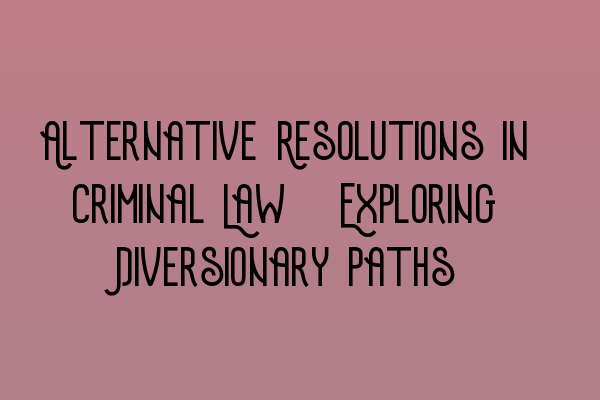Alternative Resolutions in Criminal Law: Exploring Diversionary Paths
When it comes to criminal law cases, the traditional approach has always been to prosecute the offender and seek a suitable punishment. However, in recent years, there has been an increasing recognition of the potential benefits of alternative resolutions in certain cases. These diversionary paths offer a different way to address criminal behavior, focusing on rehabilitation and reducing the likelihood of reoffending. In this article, we will explore some of the key aspects of alternative resolutions in criminal law.
The Concept of Diversionary Paths
Diversionary paths are a set of alternative measures that can divert individuals away from the formal criminal justice system. These measures aim to address the underlying causes of criminal behavior and provide opportunities for rehabilitation and reintegration into society. By offering support and guidance, diversionary paths seek to prevent further criminal activity and promote positive change.
One example of a diversionary path is community service. Instead of facing traditional punishment, individuals may be required to perform a certain number of hours of community service. This not only benefits the community but also allows the offender to gain valuable skills and develop a sense of responsibility.
Another option is restorative justice, which emphasizes repairing the harm caused by the offense. This involves bringing together the offender, the victim, and relevant stakeholders to discuss the consequences of the crime and find ways to make amends. Restorative justice can help facilitate healing and closure for the victim while promoting empathy and understanding for the offender.
Benefits of Alternative Resolutions
Alternative resolutions offer several advantages over traditional prosecution and punishment. Firstly, they can provide a more holistic approach to addressing criminal behavior. By considering the individual circumstances and needs of the offender, alternative resolutions have the potential to address the root causes of criminality and promote lasting change.
Secondly, alternative resolutions can help alleviate the burden on the formal criminal justice system. With limited resources and overcrowding in prisons, diversionary paths offer a way to reduce the number of individuals entering the system, allowing law enforcement agencies and courts to focus their attention on more serious offenses.
Finally, alternative resolutions can have a positive impact on the community. By focusing on rehabilitation and reintegration, these paths can contribute to a safer and more harmonious society. When offenders are given the opportunity to learn from their mistakes and change their behaviors, the likelihood of reoffending decreases, benefiting both the individual and the community as a whole.
Implementing Alternative Resolutions
Integrating alternative resolutions into the criminal justice system requires careful planning and collaboration between various stakeholders. It involves creating frameworks and guidelines that ensure fairness and consistency while addressing individual circumstances. Proper training and education for legal professionals and practitioners are crucial to successfully implementing these diversionary paths.
If you are interested in pursuing a career in criminal law and want to learn more about the legal profession, SQE Criminal Law & Practice Law UK can provide valuable guidance and support. Check out our SQE Sample Papers: Practice for Exam Success article to familiarize yourself with the exam format and boost your preparation.
For aspiring lawyers, it is essential to understand the key concepts and focus areas of SQE1 and SQE2. Our article on Focus Areas in SQE1 and SQE2: Mastering Key Concepts can provide valuable insights and help you prioritize your study efforts.
When preparing for the SQE exams, it is vital to adapt your study strategy based on your mock performance. Learn how to analyze your results effectively and make the necessary adjustments with our article on Adjusting Your SQE Strategy Based on Mock Performance.
In addition, participating in SQE mock debrief sessions is a critical step for improvement. Our article on SQE Mock Debrief Sessions: Critical Steps for Improvement provides valuable tips and strategies for maximizing the benefits of these debriefing sessions.
Last but not least, practicing with SQE sample papers is essential for elevating your scores. Our article on Practicing with SQE Sample Papers: Elevating Your Scores offers practical advice and techniques to make the most of your preparation.
